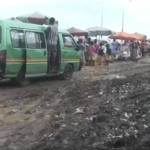Abacha’s Mourners
Posted by By Akogun Akomolafe at 19 December, at 08 : 59 AM Print
Warning: count(): Parameter must be an array or an object that implements Countable in /home/alaye/public_html/wp-content/themes/Video/single_blog.php on line 46
Warning: count(): Parameter must be an array or an object that implements Countable in /home/alaye/public_html/wp-content/themes/Video/single_blog.php on line 56
From my Archives
The late Nigerian strongman, Sanni Abacha, cut such a complete macho image that I thought that, at last, here was one mortal who will defy Shakespeare’s observation that, “…death, a necessary end, will come when it will.”
With his mafia-don dark glasses and devil-may-care countenance, Abacha didn’t look or acted like a man susceptible to human frailties like you and I. Though the jury is still out whether or not the tyrant died a natural or man-made cause. The strongman’s death will surely make the Guinness Book of Records as the first recorded death of a chief of state that was celebrated by his people. On hearing the demise of Abacha, many Nigerians trooped to the beer-parlors (drinking spot in Ghanaian parlance) to drown in beer in celebration. A Nigerian opposition figure praised the lord “for the death of that evil man.”
A group of Nigerians was, however, beside themselves with sorrow over the death of the late dictator’s death. I ran into them at the Sahara Hotel at Odorkor. There were five of them: two Yorubas, two Igbos, and one Hausa. Their faces were the very pictures of anguish. They were still inconsolable over two months after the passing away of the oppressor. They have refused to either change their clothes or shave their now populous beards. The Hausa among them was still fasting.
“Are you guys members of the ‘Youth Earnestly for Abacha,’ or a member of the myriad of government-sponsored organizations to sing the praise of the autocrat?” I asked them.
They gave me languished glances. One of the Igbo guys, breathing from the depth of his thick beard, wailed, “You don’t understand, my brother. My people say “The old man that’s running in the afternoon, if nothing is pursuing him, then he’s pursuing something. You understand?”
I understood the proverb but could make the connection. I told them so. The Hausaman bellowed like an angry Iman, “You think we fit be for government. The thing wey they worry us pass Abacha self.”
They were talking in riddles and I pleaded with them to tell me their tales. After a series of “Ori Baba mi o, ori mama mi o. Mo gbe!” the Yoruba man opened up and told me their story. It happens that these fellas were on transit to what they believe were greener pasture in Europe. They have collected all the necessary papers declaring them political refugees fleeing the dungeon that was Nigeria. They were going to stow away on a ship in Tema. The ship was due four days before Abacha kicked the bucket. What to do?
Wailing like a banshee, one of the Igbos showed me the ‘genuine’ documents, he had paid good money prices to collect.
I studied the documents. The tale was mind-boggling: According to affidavits sworn at the Supreme Court of Nigeria (affidavits are not sworn at Supreme courts), his entire village (he mentioned an unpronounceable Yoruba name and gave Ondo state as his state of origin) had been wiped out because they participated in an Anti-Abacha rally sponsored by the opposition. His father was the village king and had been subjected to (don’t let us describe it here) brutalities. He alone was the survival of the orgy of murder and mayhem. He was lucky to be away to the farm when the soldiers struck. Attached were photocopies of old newspapers clipping depicting the Nigerian army ‘pacifying’ a village. Although the pictures were blurred, I could read some of the placards: it belongs to MOSOP, the movement set up by the Ogonis to protest the devastation of their land.
“But you are an Igbo, why are you named Akin Oguntokun? Se Ondo state le ti wa?” I asked to test his Yoruba.”
He gave me a withering look. “Which one you dey self? Na you be European immigration? I beg make you comout there. Do you think that the Europeans are fools? They know that only the Yorubas had problems with Abacha. Do you think that they will give political asylum to an Igbo? Comout there, my friend.”
According to his sworn affidavit, the Hausa was born and bred in Osogbo in Osun state. The gist of his story was that he had to escape Nigeria when the state administrator took a fancy to his girlfriend. True to type, the army man sent a battalion of heavily-armed troops to ‘pacify’ his quarters. In the blitzkrieg that ensued, six-hundred and fifty-eight peace-loving, unarmed civilians; three-hundred and thirty-two goats, seven-hundred and one chicken were killed. No house was left standing; they were all torched. Not-so- good-quality-Polaroid pictures accompanied the gory details.
“Why the precise figures for the animals?” I wanted to know.
He blew mucous into a handkerchief and pulled at his Muslim-fundamentalist beard before replying. “Don’t you see how it enhances the story? The death of the animals will elicit more sympathy from the Europeans than the death of some African peasants. White men like pets more than Africans.”
I studied the equally gory tales of the other three and exclaimed, “Oh, I see. What to do now?”
Between sobs, the Hausa man answered me. “If no be for the new yeye man, we for know where we are now. How can he come and make policy that is not good for the country?”
“What policy has he made that was not good for Nigeria?” I wanted to know.
One of the Yorubas answered, “Do you mean to tell me,” he howled at me. “Do you mean to tell me that his policies are good for Nigeria, ehn. Answer me, are they good?”
I didn’t know what the new Nigerian strongman had done to incur the opprobrium of these guys and I made the mistake of telling them.
The other Igbo who have been quiet except to moan like a wounded hyena took threatening steps towards me. His eyes were blood-shot. “So you think that releasing political prisoners and announcing dates for election is good for us? Look at us. Look at me.”
“Mo gbe. ” cried the loquacious Yoruba like a goat in labour. “How am I going to explain back at home? I sold my father’s cocoa farm to collect my papers, ehn. My brother, tell me, how am I going to explain!”
“But the international community is hailing Abubakar for the steps he has taken.”
It was like stoking their fire; their ire was rekindled. “International community,” spat the Hausa. “Na International Community we go chop? Will your International community pay back the money I spent? Allah, I no blame you, but Abacha for stay longer small.”
The other Yoruba groaned loudly. “God did not try at all. At least he should have allowed us to reach at least the ocean before he took Abacha away. We would have confronted the Europeans with a fait accompli. At least we will in Europe by now. It would have been a mere academic exercise.
The macho Igbo grunted. “As for me, I am not going back. There is no way I am stepping that country until I have the money to pay back all I borrowed before that yeye man go die. I even sold my brother’s pharmacy. If he catch me, I die be dat. Me, my leg no go step that country for long, long time.”
His words seem to have calming effects on them. I returned their papers to them and left wondering what Abacha, looking down on them, will be thinking about the mess he left, not only his country but these compatriots of his he had left in limbo.
About the Author
Femi Akomolafe is a passionate Pan-Africanist. A columnist for the Accra-based Daily Dispatch newspaper and ModernGhana, and Correspondent for the New African magazine, Femi lives in both Europe and Africa and writes regularly on Africa-related issues for various newspapers and magazines.
Femi was the producer of the FOCUS ON AFRICANS TV Interview programme for the MultiTV Station.
He is also the Man and Machine Coordinator at Alaye Dot Biz Limited, a Kasoa-based Multimedia organization that specializes in Audio and Video Production. He loves to shoot and edit video documentaries.
His highly-acclaimed books (“Africa: Destroyed by the gods,” “Africa: It shall be well,” “18 African Fables & Moonlight Stories” and “Ghana: Basic Facts + More”) are available for sales at the following bookshops/offices:
- Freedom Bookshop, near Apollo Theatre, Accra.
- WEB Dubois Pan-African Centre, Accra
- Ghana Writers Association office, PAWA House, Roman Ridge, Accra.
- Afia Beach Hotel, Accra
Where to buy them online:
On Lulu Books:
18 African Fables & Moonlight Stories https://goo.gl/Skohtn
Ghana: Basic Facts + More: https://goo.gl/73ni99
Africa: Destroyed by the gods: https://goo.gl/HHmFfr
Africa: It shall be well: https://goo.gl/KIMcIm
Africa: it shall be well
on Kindle books: https://www.createspace.com/4820404
on Amazon books: http://goo.gl/QeFxbl
on Lulu Books: https://goo.gl/SQeoKD
Africa: Destroyed by the gods
on Kindle books: https://www.createspace.com/4811974
18 African Fables & Short Stories: https://goo.gl/s9tWAf
on Amazon books: http://goo.gl/1z97ND
on Lulu Books: http://goo.gl/KIMcIm
My Lulu Books page: http://www.lulu.com/spotlight/FemiAkomolafe
Get free promotional materials here:
- Africa: it shall be well: http://alaye.biz/africa-it-shall-be-well-introduction-in-pdf/
A FREE Chapter of ‘Africa: It shall be well’ can be downloaded here: http://alaye.biz/africa-it-shall-be-well-a-free-chapter/
- Africa: Destroyed by the gods (How religiosity destroyed Africa) http://alaye.biz/africa-destroyed-by-the-gods-introduction/
A FREE Chapter of ‘Africa: Destroyed by the gods’ can be downloaded here: http://alaye.biz/africa-destroyed-by-the-gods-free-chapter/
Femi’s Blog: www.alaye.biz/category/blog
Websites: www.alaye.biz ; www.akogun.tv
Femi on Amazon https://www.amazon.com/author/femiakomolafe
Femi Akomolafe’s Lulu Books page: http://www.lulu.com/spotlight/FemiAkomolafe
Twitter: www.twitter.com/ekitiparapo
Facebook: https://www.facebook.com/FemiAlaye
Gmail+: https://plus.google.com/112798710915807967908;
LinkedIn: www.linkedin.com/in/femiakomolafe;
YouTube Channel: https://www.youtube.com/user/fakomolafe
Email: fakomolafe@gmail.com
Profile on New African magazine: http://newafricanmagazine.com/tag/femi-akomolafe/




